Whistleblower Protection Bill Introduced in Senate
A legislative proposal aimed at creating a commission for the safeguarding and monitoring of individuals who report misconduct was presented in the Senate on Friday.
According to the provisions of the bill, information can be submitted to the commission by any person, organization, or entity, on the condition that the whistleblower attests to the accuracy of the details.
Submissions must be documented in writing and accompanied by supporting evidence. However, the commission will not act on information if a whistleblower’s identity is concealed or falsified.
The bill stipulates that information posing a threat to Pakistan’s security, sovereignty, strategic interests, or economic soundness will be excluded.
Furthermore, details pertaining to international relations, content restricted by the Official Secrets Act, promotion of unlawful behavior, records of ministers and secretaries, or affairs of the cabinet and its associated committees will be deemed inadmissible.
Similarly, information limited by legal provisions or court rulings, or that encroaches on the privileges of parliament or assemblies, will be rejected.
The commission is also set to disregard proprietary information, confidential data, private foreign communications, and any particulars that might impede ongoing inquiries or legal actions against an accused individual.
Likewise, information that might jeopardize someone’s life, compromise the confidentiality of law enforcement, lack relevance to the public interest, or infringe upon personal privacy will be dismissed.
The commission is empowered to summon individuals for sworn testimony, scrutinize records and evidence, and examine documents and witnesses.
It can also seek access to official records. An appointed officer of the commission is authorized to secure full cooperation and retrieve documents from governmental bodies, regulatory agencies, banks, and financial institutions.
This officer is required to evaluate the provided information within a period of 60 days. Should further inquiry or investigation be necessary, and the matter constitutes a criminal offense, the commission is obligated to refer the case to the appropriate authority.
The legislation guarantees protection against retaliation for whistleblowers. Should a whistleblower experience harm, they have the right to lodge a complaint with the commission, which will then forward it to the relevant authority.
If the information shared is validated, the whistleblower will receive a reward equivalent to 20% of the recovered funds, along with a formal acknowledgement. In instances involving multiple whistleblowers, the reward will be divided equally among them.
Conversely, the provision of inaccurate information will result in a penalty of up to two years of imprisonment and a monetary fine of up to Rs200,000, payable to the individual harmed by the misinformation.
The identity of a whistleblower will be strictly protected. Any individual who discloses their identity will be subject to a fine of Rs500,000 and a potential prison sentence of up to two years.



Comments (0)
No comments yet. Be the first to comment!
Leave a Comment